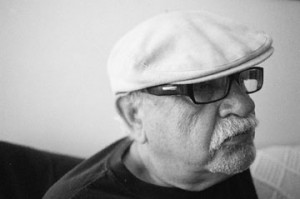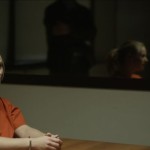AT THE END OF A VERY BAD DAY
AT THE END OF A VERY BAD DAY: Larry Kent’s EXLEY
-Kier-La Janisse
———————-
“Someone must have been telling lies about Joseph K., for without having done anything wrong he was arrested one fine morning”
You know that old saying that gets trotted out again and again about filmmakers aged 50+ “This guy has been making films for XX years and shows no sign of mellowing…” Well, never has that sentiment rang more true than with our own Larry Kent, a director who has been making subversive films on his own terms since 1962’s The Bitter Ash (considered the first Canadian independent film). His latest film Exley lets you know where it stands right from the get-go: with the one-two punch of a fight scene and a sex scene, followed by some of the most hysterical post-coitus behaviour imaginable, you know Kent’s not going to hold anything back. But these very physical confrontations are only the foreplay for the anarchic mental skirmishes to canadian pharmacy viagra generic come.
A young man named Exley wakes up one morning in the arms of a beautiful woman. The phone rings, and on the other end someone from his past viagra from canada breaks some horrible news. The woman in bed beside him starts clamouring for attention, ignoring the distress registering on his face as the phone call continues. As she gets louder, more manic and in his face, he is eventually forced to eject this canadian pharmacy cialis soft screaming and naked woman from his apartment. Thus begins Exley’s very bad day.
Over the course of this day he will be led from place to place under increasingly bizarre circumstances in search of the $1000 plane fare that will bring him to his mother’s bedside. With such a modest and noble goal, and a protagonist willing to do practically anything to earn the money, surely it can’t be that hard to come up with the funds. But as he is led through a labyrinthine underground of gangsters, witches and weirdos who all use him and leave him to dry, he starts to get the feeling that someone is conspiring against him – and as the audience, we tend to concur.
Although he didn’t write the film himself – the treatment was written by Vancouver actor/director and Vancouver Film School prof Bill Marchant – Exley is also an interesting analogy for Kent’s own career, and the nonsensical bureaucratic obstacles that have prevented him from getting a film made with the same kind of support enjoyed by other Canadian directors of his calibre and pedigree. Spectacular Optical got a few words from Larry Kent about his latest film, its improvisational technique and its protagonist’s redemptive journey.
——————-
The film starts off with a guy getting pummelled, and then a sex scene. Your films always had subversive ideas but with Hamster Cage and now Exley they definitely seem to be getting more furious. Where is this confrontational edge coming from?
The answer is simple. The more they try to stop me from making films the more determined I am.
How did the film come together – I understand it was a Vancouver Film School production, or at least that the connections came through film professionals who are also teachers there?
The film was not a VFS production, however many of the major contributors work there and we received a lot support from the school. The writer of the film’s outline, Bill Marchant, is head of the VFS acting department.
Tell me about the improvisational aspects of the film. What was the interplay between what Bill Marchant wrote and what the cast improvised?
The film was totally improvised. Shane Twerdun [who plays the title character] and I met with each cast member over a period of five days and discussed the character’s inner life and motivations. That way we were able to work without rehearsals when it came time to shoot.
The performances are a big part of why the more surreal aspects of the film still work. Were there any points where you felt you had to be extra careful not to lose the audience, because of certain turns the film was taking?
The answer to that is yes. We were never sure if we achieved it or not. The preparation for each scene was very strong. The actors were absolutely centered in their performances. I know both Tom Scholte and Nancy Sivak well. What surprised me was that Nancy was able to be totally free during the scene. I was astonished by her lack of inhibition. Tom had an incredible sense of who the character was and what he wanted. That made him very real. In both cases their performances were so good it never occurred to me if the audience would or wouldn’t get it.
I liked how Exley’s efforts to maintain social propriety were undermined so quickly in every situation that he would eventually come off as though he was the one being rude. Aside from the larger Kafka-esque themes running through the film it also seemed a pretty apt depiction of how social situations can go awry so easily.
Yes, absolutely.
The poker players at the Boxing Club directly reference Josef K.: in what ways do you think the character Exley is like/unlike Josef K.? He doesn’t seem like just a retread of the character, there are some different things going on.
Joseph K was not on my mind. Well, maybe he was subconsciously. We were constantly, Shane and I, asking ourselves. “who is this guy and why is this happening to him?”
I know Matthew Hays referred to the film as existential, but it seems more purgatorial to me – Exley’s being put through a series of tests and trials by some unseen web of conspirators. But you don’t give a lot of background on Exley – what is he being punished for?
It is purgatorial. I see Exley as a reverse of A Rakes Progress. If you look at Hogarth’s pictures, an innocent man starts out and ends up dying a rake and an alcoholic. Exley starts out in degradation and finds his innocence. Which is totally against a Larry Kent attitude.
Exley seems to know the woman in the bed with the bag over her head and the slashed wrists. Who is she supposed to be?
Originally she was intended to be an old girlfriend. Due to conflicts with producers we weren’t able to fully realize this aspect of the story.
I kept feeling like the one-eyed man at the end just wanted Exley to ask for forgiveness. Were there ever any three words in mind that the man wanted to hear?
The one eyed man was looking for innocence of his own. That some human being could release his pain. I didn’t believe he cared for Exley at all.
Where do you think Exley fits in genre-wise, and has this been a problem in getting the film seen?
I think the genre is fantasy. I think as the film goes through the festival circuit we may learn where it truly lies.
You’ve said that you are going to make a new film for the 50th anniversary of The Bitter Ash – which is next year – what’s the story on this film, is something particular in development?
It’s a film within a film. It concerns madness, similar to Polanski’s Repulsion. We don’t have financial backing but were going to make it in the usual larry kent way. The plan is to shoot in march next year out in Vancouver. There’s also a production team from white buffalo films headed by Exley’s lead Shane Twerdun currently making a documentary about me.
I still find it bizarre that under another set of circumstances you could have been the director of ILSA: SHE WOLF OF THE SS and MEATBALLS. What do you think these films would have been like if they were Larry Kent films?
Those films would still have been and could only have been Cinepix films. They would have been stressful, and the more I think about it, the question is unanswerable.
——————
EXLEY has its World Premiere at Fantasia on Monday August 1 at 7:30pm in the Salle JA DeSeve. More info on the film page HERE.

 August 1, 2011
August 1, 2011  No Comments
No Comments








